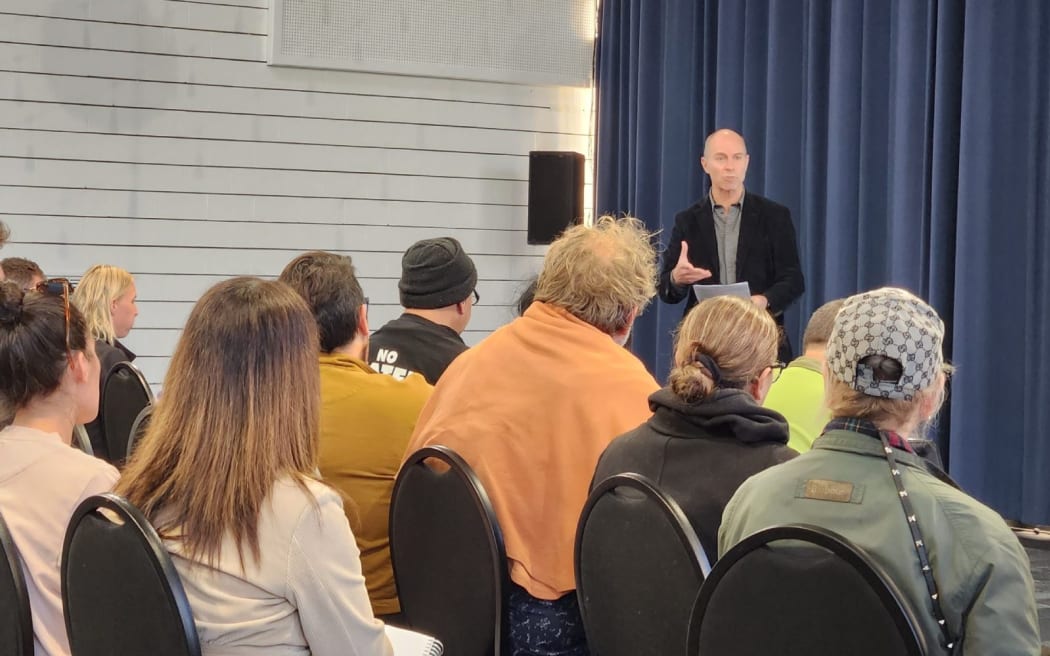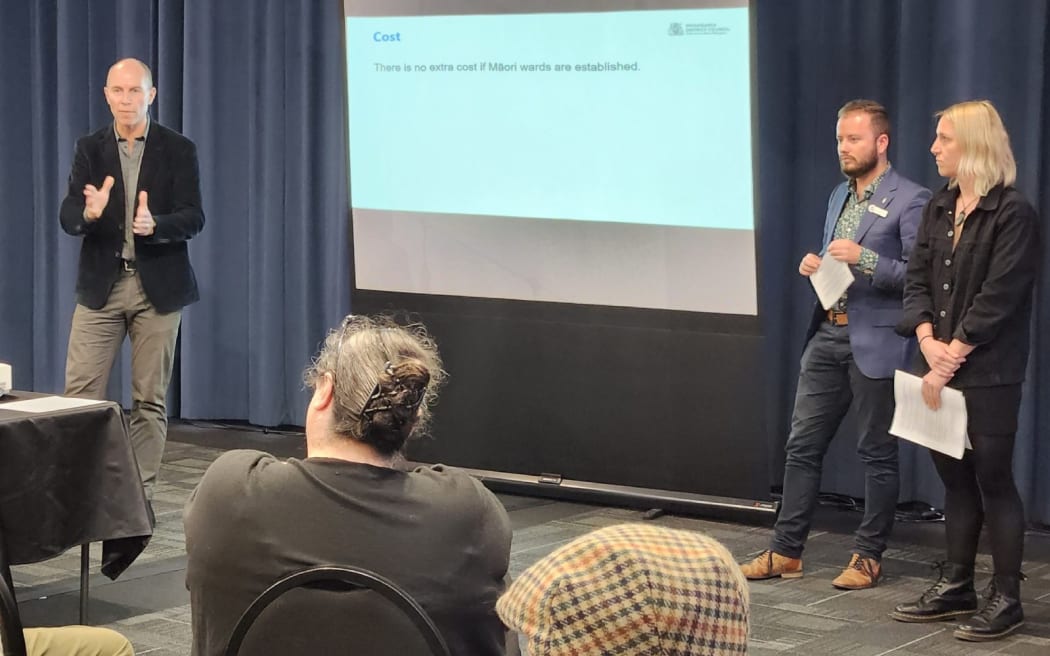
Whanganui Mayor Andrew Tripe at the Community Kōrero event on whether to introduce Māori wards. Photo: Moana Ellis
Whanganui will have Māori wards if its council gives weight to a public meeting strongly in favour of guaranteeing Māori representation.
Under the Local government Electoral Legislation Bill, Whanganui District Council is required to decide by 23 November whether to have “specific Māori representation”.
Thursday night’s meeting of about 25 people appeared overwhelmingly in favour of introducing Māori wards as a way to guarantee Māori participation in council decision-making in a district where it has been difficult to get Māori elected to the council.
But speaker after speaker also said the ward system proposed was flawed and existing legislation did not allow for the solution needed in Whanganui.
They called for a wider conversation on constitutional change and suggested the council design a new model for Māori representation that meets Whanganui’s needs.
“It may sound ridiculous, but why can’t we have a bicameral system?” attendee Louise Follett asked. “That sounds pie-in-the-sky but to me that would be much fairer.”

Councillor Josh Chandulal-Mackay said that would require constitutional reform. He said the parameters for local government representation were prescribed under legislation and the council was required to work to that.
“Why can’t we fight for constitutional reform?” Follett said. “Why do we have to take what they’ve given us? We need to push back.”
Mayor Andrew Tripe said change was required.
“Local government needs reform. But we do not have the answers to everything.”
The public meeting was called by the mayor under his Community Kōrero initiative. It included presentations from Tripe, Chandulal-Mackay and councillor Charlotte Melser, and was also attended by councillors Kate Joblin, Peter Oskam and Philippa Baker-Hogan.
Chandulal-Mackay said the council had not got right its past decision-making process on whether to institute Māori wards.
“Previously when we’ve been asked to make a decision around Māori wards, it’s my view that we have not consulted adequately or put enough groundwork into informing the decision.”
Under existing legislation, the number of Māori seats would be based on the size of the Māori and general electoral rolls, relative to the number of councillors. Based on the Māori roll in Whanganui of 8910 and the general roll of 39,800, a council of 12 plus the mayor would see two councillors elected from Māori wards and 10 from general wards.
Melser said it was important to note that under a Māori ward system, voters on the Māori roll would vote only for the two Māori seats and not the remaining 10 general seats.

Whanganui Mayor Andrew Tripe (far left) and councillors Josh Chandulal-Mackay and Charlotte Melser field challenges over a “fundamentally flawed” Māori electoral system. Photo: Moana Ellis
“That means that those on the Māori roll will only have two votes plus the mayor, and anyone on the general roll will have 10 votes plus the mayor.”
Asked if she thought that was fair, she said “I do not”.
“If we only have two votes on that Māori roll, then we can’t vote for any other Māori that might be standing on the general roll,” attendee Tania Bailey said.
Karley Hemopo said the restriction was “essentially racist”.
“It’s a very undemocratic way of doing it. It’s a pākehā system and yet you’re wanting us to participate, but you shut down all the doors for us to participate. Why can’t we just establish a ward and say we want this for our city – let’s just do it.”
Others agreed.
“Let’s be transformational in Whanganui, instead of toeing the line,” Bailey said.
“[Māori] should be able to vote for everybody and also choose their representative,” another attendee said. “I came in here as a pākehā person who’s been in Whanganui for four or five generations. I came in here thinking, why can’t we be equal and work together?”
Daniel (DC) Harding, who stood unsuccessfully for the mayoralty at last October’s local government election, said the system was “fundamentally flawed” because the Māori roll was developed in 1868 “for the purpose of Māori to have a voice at Parliament, not in local [government]”.
“Since 1868 we’ve been stuck with the system. The kōrero I’ve heard tonight is there’s nothing we can do about it, but I’m interested to know why we’re not discussing a wider ward system where Whanganui is divided into multiple wards – and you could include the Māori ward – where there may be two seats per ward.”
Garry Davis said the general voter and a general candidate elected to the table could never provide a Māori worldview.
“They will not have a Māori lens.”
Joblin asked if the advice to council was to introduce Māori wards.
“You’re suggesting that to get a Māori worldview around the table, we should have a Māori ward system – is that the advice we are getting from you even though that means you can’t vote for 10 other councillors?”
“We’re not happy about that either,” Bailey said. “That’s something we can work on, because that’s unfair to us as well. But if you want a Māori lens, you need Māori around the tēpu. You can’t learn that.”
Tripe said a decision on Māori wards was the first step in the council’s representation review which will test whether the number of councillors and existing arrangements are right for Whanganui. The review will determine how the council is made up, including the number of councillors, whether they will be elected through wards or at large, boundaries, ward names, and whether there will be community boards.
There are currently 12 councillors and one mayor elected at large, and a Rural Community Board.
The council has consulted on Māori wards with the wider community through an online survey that closes at midnight (Friday). It has also consulted directly with its Māori, hapū and iwi relationship partners.
Māori wards would not replace relationships with hapū, iwi, tangata whenua, mana whenua, individuals and whānau, the council said. Instead, Māori wards would be an additional mechanism to include Māori in council decision-making.
Local Democracy Reporting is Public Interest Journalism funded through NZ On Air.